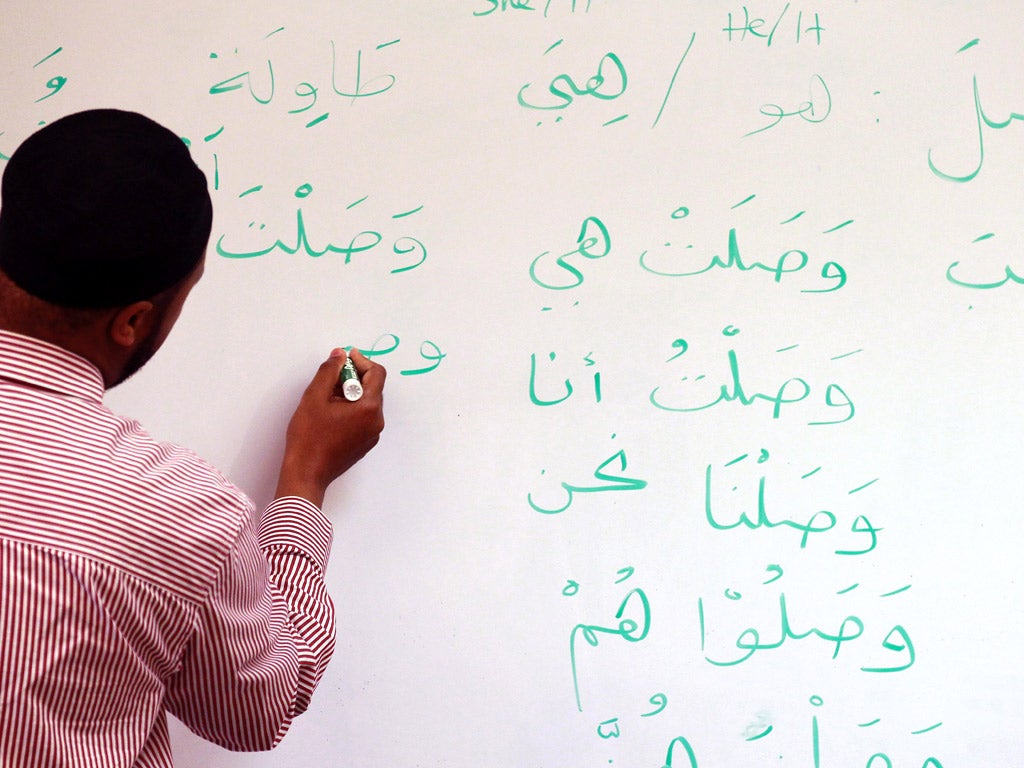UK's international education body highlights most important foreign languages to learn
British Council report calls on report calls on policymakers to introduce a broader range of languages into every child's education

Your support helps us to tell the story
From reproductive rights to climate change to Big Tech, The Independent is on the ground when the story is developing. Whether it's investigating the financials of Elon Musk's pro-Trump PAC or producing our latest documentary, 'The A Word', which shines a light on the American women fighting for reproductive rights, we know how important it is to parse out the facts from the messaging.
At such a critical moment in US history, we need reporters on the ground. Your donation allows us to keep sending journalists to speak to both sides of the story.
The Independent is trusted by Americans across the entire political spectrum. And unlike many other quality news outlets, we choose not to lock Americans out of our reporting and analysis with paywalls. We believe quality journalism should be available to everyone, paid for by those who can afford it.
Your support makes all the difference.Arabic is ranked as a more important language for children to learn in school than French in a report published by the British Council today.
The study, Languages for the Future, also rates Mandarin as more vital than German to the UK over the next 20 years. Spanish, though, is considered the most important language to learn.
The report calls on policymakers to introduce a broader range of languages into every child's education.
"The problem isn't that we're teaching the wrong languages because the most widely-taught languages like French, Spanish and German all feature in our top ten," said John Worne, director of strategy at the British Council, the UK's international organisation for educational opportunities and cultural relations.
"But the UK needs more people to take up the opportunity to learn and, crucially, get using these languages - along with new ones like Arabic, Chinese and Japanese.
"If we don't act to tackle this shortfall, we'll lose out both economically and culturally. Schools have their job to do but it's also a problem of complacency, confidence and culture - which policy makers, businesses, parents and everyone else in the UK can help to fix."
The British Council report compiled its top 10 of the most useful languages to learn by using a sophisticated ranking system - which gave weight for current export links with the countries concerned, UK government trade priorities, diplomatic and security priorities and holiday destinations.
It concluded the UK had an "alarming" shortage of people able to speak any of the 10 languages identified - with three-quarters of the population unable to speak any of the languages fluently enough to hold a conversation in them.
French was the only language where fluent speakers were in double figures (15 per cent). It was followed by German (six per cent), Spanish (four per cent) Italian (two per cent) and Arabic, Mandarin, Russian and Japanese (all one per cent). Fewer than one in 100 could speak Portuguese or Turkish, which made up the 10.
According to figures from the Joint Council for Qualification - the umbrella body representing exam boards, less than half of GCSE students (44 per cent) took a language exam this summer despite an improvement on recent years.
Even football chiefs joined in the condemnation of the UK's performance in languages with Martyn Heather, head of education at the Premier League, warning a lack of language skills would make it difficult for UK players to play or coach abroad.
"Language skills are just as important for a young aspiring footballer as they are for someone who wants to enter the world of international commerce," he added.
"Being able to speak another language opens up a world of opportunities to play and coach in football leagues across the globe."
On Arabic, the report said: "Six Arabic speaking countries appear among the UK's top 50 export market in goods with a combined value to the economy of over £12 billion - more than the value of UK exports to Spain, China or Italy ..
"Arabic has emerged as one of the priority languages for the Foreign and Commonwealth Office. It is their intention to increase the number of diplomats trained in Arabic by 40 per cent."
On Mandarin, it adds: "Given its rapid growth and status as a major emerging power, the business opportunities and challenges in China are great."
A spokesman for the Department for Education said its reforms - masking languages compulsory from the age of seven and included it as a compulsory subject for the English Baccalaureate league table ranking - "will ensure that hundreds and thousands more young people will study languages every year".
Join our commenting forum
Join thought-provoking conversations, follow other Independent readers and see their replies
Comments